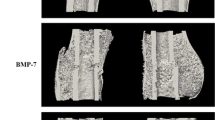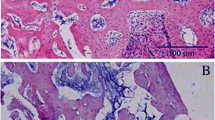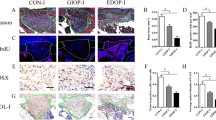Abstract
Introduction
This study characterizes ovariectomized (OVX)-induced osteoporotic fracture healing with focus on estrogen receptors (ERs). Callus formation plays a critical role in fracture healing, and ERs are well-known mechanosensors in osteogenic pathways. It was hypothesized that callus formation was related to and partially determined by the difference in expression patterns of ERs in both normal and OVX-induced osteoporotic fractures.
Methods
Closed femoral fracture in SHAM and ovariectomized rats were used in this study. Weekly callus width (CW) and area (CA), endpoint mechanical properties, gene expressions of Col-1, BMP-2, ER-α, ER-β and ER-α:ER-β ratios (ER-ratios), and correlations were assessed at 2, 4 and 8 weeks post-fracture.
Results
CW and CA results confirmed that OVX-induced osteoporotic fracture was delayed at 2–4 weeks with impaired endpoint mechanical properties. Gene expressions of ER-α and ER-β were higher in the SHAM group at week 2 (p < 0.05) and later lowered at week 8; whereas the OVX group showed an opposing trend. Moderate correlation existed between ER-α and BMP-2 (0.545, p = 0.003), and ER-ratio and BMP-2 (0.601, p = 0.001), and BMP-2 to CW and CA (r = 0.709, p = 0.000 and r = 0.588, p = 0.001, respectively). ER-α and ER-β proteins expressions were confirmed by immunohistochemistry at the fracture callus in reparative progenitor cells, osteoblasts- and osteoclasts-like cells.
Conclusion
We conclude that the delayed healing rate and impaired callus quality in OVX-induced osteoporotic fracture is related to the delayed expression of ERs. A high ER-α:ER-β ratio favors callus formation.






Similar content being viewed by others
References
Aguirre JI, Plotkin LI, Gortazar AR et al (2007) A novel ligand-independent function of the estrogen receptor is essential for osteocyte and osteoblast mechanotransduction. J Biol Chem 282(35):25501–25508
Armstrong VJ, Muzylak M, Sunters A et al (2007) Wnt/beta-catenin signaling is a component of osteoblastic bone cell early responses to load-bearing and requires estrogen receptor alpha. J Biol Chem 282(28):20715–20727
Bakker AD, Klein-Nulend J, Tanck E, Albers GH, Lips P, Burger EH (2005) Additive effects of estrogen and mechanical stress on nitric oxide and prostaglandin E2 production by bone cells from osteoporotic donors. Osteoporos Int 16(8):983–989
Batra GS, Hainey L, Freemont AJ et al (2003) Evidence for cell-specific changes with age in expression of oestrogen receptor (ER) alpha and beta in bone fractures from men and women. J Pathol 200(1):65–73
Beamer B, Hettrich C, Lane J (2009) Vascular endothelial growth factor: an essential component of angiogenesis and fracture healing. HSS J 6(1):85–94
Boden SD, Joyce ME, Oliver B, Heydemann A, Bolander ME (1989) Estrogen receptor mRNA expression in callus during fracture healing in the rat. Calcif Tissue Int 45(5):324–325
Bonnarens F, Einhorn TA (1984) Production of a standard closed fracture in laboratory animal bone. J Orthop Res 2(1):97–101
Cheung WH, Chin WC, Qin L, Leung KS (2012) Low intensity pulsed ultrasound enhances fracture healing in both ovariectomy-induced osteoporotic and age-matched normal bones. J Orthop Res 30(1):129–136
Cheung WH, Chow SK, Sun MH, Qin L, Leung KS (2011) Low-intensity pulsed ultrasound accelerated callus formation, angiogenesis and callus remodeling in osteoporotic fracture healing. Ultrasound Med Biol 37(2):231–238
Cheung WH, Sun MH, Zheng YP et al (2012) Stimulated angiogenesis for fracture healing augmented by low-magnitude, high-frequency vibration in a rat model-evaluation of pulsed-wave doppler, 3-D power doppler ultrasonography and micro-CT microangiography. Ultrasound Med Biol 38(12):2120–2129
Chow DH, Leung KS, Qin L, Leung AH, Cheung WH (2010) Low-magnitude high-frequency vibration (LMHFV) enhances bone remodeling in osteoporotic rat femoral fracture healing. J Orthop Res 29:746–752
D’Ippolito G, Schiller PC, Ricordi C, Roos BA, Howard GA (1999) Age-related osteogenic potential of mesenchymal stromal stem cells from human vertebral bone marrow. J Bone Miner Res 14(7):1115–1122
Damien E, Price JS, Lanyon LE (2000) Mechanical strain stimulates osteoblast proliferation through the estrogen receptor in males as well as females. J Bone Miner Res 15(11):2169–2177
Giannoudis P, Tzioupis C, Almalki T, Buckley R (2007) Fracture healing in osteoporotic fractures: is it really different? A basic science perspective. Injury 38(Suppl 1):S90–S99
Gruber CJ, Tschugguel W, Schneeberger C, Huber JC (2002) Production and actions of estrogens. N Engl J Med 346(5):340–352
Hao YJ, Zhang G, Wang YS et al (2007) Changes of microstructure and mineralized tissue in the middle and late phase of osteoporotic fracture healing in rats. Bone 41(4):631–638
He YX, Liu Z, Pan XH et al (2012) Deletion of estrogen receptor beta accelerates early stage of bone healing in a mouse osteotomy model. Osteoporos Int 23(1):377–389
He YX, Zhang G, Pan XH et al (2011) Impaired bone healing pattern in mice with ovariectomy-induced osteoporosis: a drill-hole defect model. Bone 48(6):1388–1400
Hou NN, Zhu YM, Huang HF (2006) The expression of estrogen receptor alpha and beta in the intervention of different estrogens in rat bone metabolism. Fen Zi Xi Bao Sheng Wu Xue Bao 39(4):289–296
Hoyland JA, Baris C, Wood L et al (1999) Effect of ovarian steroid deficiency on oestrogen receptor alpha expression in bone. J Pathol 188(3):294–303
Jarvinen TL, Kannus P, Pajamaki I et al (2003) Estrogen deposits extra mineral into bones of female rats in puberty, but simultaneously seems to suppress the responsiveness of female skeleton to mechanical loading. Bone 32(6):642–651
Jessop HL, Suswillo RF, Rawlinson SC et al (2004) Osteoblast-like cells from estrogen receptor alpha knockout mice have deficient responses to mechanical strain. J Bone Miner Res 19(6):938–946
Kanakaris NK, Petsatodis G, Tagil M, Giannoudis PV (2009) Is there a role for bone morphogenetic proteins in osteoporotic fractures? Injury 40(Suppl 3):S21–S26
Kubo T, Shiga T, Hashimoto J et al (1999) Osteoporosis influences the late period of fracture healing in a rat model prepared by ovariectomy and low calcium diet. J Steroid Biochem Mol Biol 68(5–6):197–202
Kuiper GG, Shughrue PJ, Merchenthaler I, Gustafsson JA (1998) The estrogen receptor beta subtype: a novel mediator of estrogen action in neuroendocrine systems. Front Neuroendocrinol 19(4):253–286
Lanyon L, Skerry T (2001) Postmenopausal osteoporosis as a failure of bone’s adaptation to functional loading: a hypothesis. J Bone Miner Res 16(11):1937–1947
Leppanen OV, Sievanen H, Jokihaara J, Pajamaki I, Kannus P, Jarvinen TL (2008) Pathogenesis of age-related osteoporosis: impaired mechano-responsiveness of bone is not the culprit. PLoS One 3(7):e2540
Leung KS, Lee WS, Tsui HF, Liu PP, Cheung WH (2004) Complex tibial fracture outcomes following treatment with low-intensity pulsed ultrasound. Ultrasound Med Biol 30(3):389–395
Liedert A, Kaspar D, Augat P, Ignatius A, Claes L (2005) Mechanobiology of bone tissue and bone cells. In: Kamkin A, Kiseleva I (eds) Mechanosensitivity in cells and tissues. Academia, Moscow
Lindberg MK, Moverare S, Skrtic S et al (2003) Estrogen receptor (ER)-beta reduces ERalpha-regulated gene transcription, supporting a “ying yang” relationship between ERalpha and ERbeta in mice. Mol Endocrinol 17(2):203–208
McCann RM, Colleary G, Geddis C et al (2008) Effect of osteoporosis on bone mineral density and fracture repair in a rat femoral fracture model. J Orthop Res 26(3):384–393
Monfoulet L, Rabier B, Chassande O, Fricain JC (2010) Drilled hole defects in mouse femur as models of intramembranous cortical and cancellous bone regeneration. Calcif Tissue Int 86(1):72–81
Namkung-Matthai H, Appleyard R, Jansen J et al (2001) Osteoporosis influences the early period of fracture healing in a rat osteoporotic model. Bone 28(1):80–86
Neidlinger-Wilke C, Stalla I, Claes L et al (1995) Human osteoblasts from younger normal and osteoporotic donors show differences in proliferation and TGF beta-release in response to cyclic strain. J Biomech 28(12):1411–1418
Orsini LS, Rousculp MD, Long SR, Wang S (2005) Health care utilization and expenditures in the United States: a study of osteoporosis-related fractures. Osteoporos Int 16(4):359–371
Rivard A, Fabre JE, Silver M et al (1999) Age-dependent impairment of angiogenesis. Circulation 99(1):111–120
Rubinacci A, Marenzana M, Cavani F et al (2008) Ovariectomy sensitizes rat cortical bone to whole-body vibration. Calcif Tissue Int 82(4):316–326
Saxon LK, Turner CH (2005) Estrogen receptor beta: the antimechanostat? Bone 36(2):185–192
Schmittgen TD, Livak KJ (2008) Analyzing real-time PCR data by the comparative C(T) method. Nat Protoc 3(6):1101–1108
Shi HF, Cheung WH, Qin L, Leung AH, Leung KS (2010) Low-magnitude high-frequency vibration treatment augments fracture healing in ovariectomy-induced osteoporotic bone. Bone 46(5):1299–1305
Sunters A, Armstrong VJ, Zaman G et al (2010) Mechano-transduction in osteoblastic cells involves strain-regulated estrogen receptor alpha-mediated control of insulin-like growth factor (IGF) I receptor sensitivity to Ambient IGF, leading to phosphatidylinositol 3-kinase/AKT-dependent Wnt/LRP5 receptor-independent activation of beta-catenin signaling. J Biol Chem 285(12):8743–8758
Vogt MT, Cauley JA, Kuller LH, Nevitt MC (1997) Bone mineral density and blood flow to the lower extremities: the study of osteoporotic fractures. J Bone Miner Res 12(2):283–289
Walsh WR, Sherman P, Howlett CR, Sonnabend DH, Ehrlich MG (1997) Fracture healing in a rat osteopenia model. Clin Orthop Relat Res 342:218–227
Wang JW, Li W, Xu SW et al (2005) Osteoporosis influences the middle and late periods of fracture healing in a rat osteoporotic model. Chin J Traumatol 8(2):111–116
Zaman G, Cheng MZ, Jessop HL, White R, Lanyon LE (2000) Mechanical strain activates estrogen response elements in bone cells. Bone 27(2):233–239
Zaman G, Jessop HL, Muzylak M et al (2006) Osteocytes use estrogen receptor alpha to respond to strain but their ERalpha content is regulated by estrogen. J Bone Miner Res 21(8):1297–1306
Zhang G, Qin L, Hung WY et al (2006) Flavonoids derived from herbal Epimedium Brevicornum Maxim prevent OVX-induced osteoporosis in rats independent of its enhancement in intestinal calcium absorption. Bone 38(6):818–825
Acknowledgments
This study was partly supported by the University Grant Committee, General Research Fund (462811), the AADO Research Fund (AADO-RF2010-001-2Y) and the CUHK Direct Grant for Research (2009.1.044).
Conflict of interest
The authors report no conflict of interest.
Author information
Authors and Affiliations
Corresponding author
Rights and permissions
About this article
Cite this article
Chow, S.K., Leung, Ks., Qin, L. et al. Callus formation is related to the expression ratios of estrogen receptors-alpha and -beta in ovariectomy-induced osteoporotic fracture healing. Arch Orthop Trauma Surg 134, 1405–1416 (2014). https://doi.org/10.1007/s00402-014-2070-0
Received:
Published:
Issue Date:
DOI: https://doi.org/10.1007/s00402-014-2070-0




